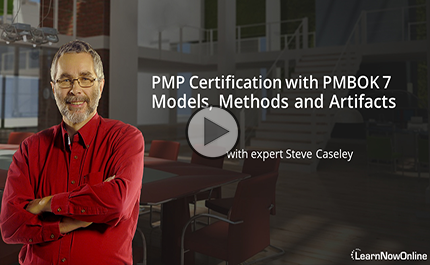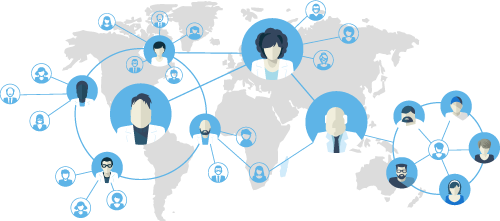Course description
Version 7 is the latest Version of project management. This series will give you everything you need to know in order to pass the exam as well as stay current on fundamental concepts. This course covers all models, methods and artifacts.
Prerequisites
Parts 1 through 3 of the series.
The PMP exam requires 36 months of leading project experience to take the test.
Meet the expert
Steve has been involved in the Information Technology Industry for over 35 years and is experienced in the management and control of all aspects of technology projects. Steve has successfully delivered a myriad projects in a large number of industry segments. He has developed a solid understanding of the issues and principles required to successfully implement solutions using a combination of rapid development techniques and traditional Project Management to ensure projects are delivered on time while still ensuring end user satisfaction. Steve has lectured part-time at local universities teaching courses in Project Management, Information Systems and Systems Analysis at both graduate and under-graduate levels.
Course outline
Module 12
Commonly Used Models (04:13)
- Introduction (00:14)
- Commomly Used Models (01:11)
- Change Models (00:23)
- Other Models (02:16)
- Summary (00:08)
Situational Leadership Models (07:32)
- Introduction (00:13)
- Situational Leadership II (03:29)
- Oscar Model (03:41)
- Summary (00:06)
Communication Models (16:26)
- Introduction (00:16)
- Communications Models (06:09)
- Feedback (01:25)
- Presentations (03:06)
- Active Listening (01:44)
- Communications Styles Assessment (03:29)
- Summary (00:13)
Motivational Models (12:16)
- Introduction (00:21)
- Motivation Models (03:40)
- Intrinsic vs. Extrinsic Motivation (03:13)
- Theory of Needs (01:21)
- Theory X (01:02)
- Theory Y (00:57)
- Theory Z (01:22)
- Summary (00:16)
Module 13
Change Models (25:23)
- Introduction (00:20)
- Change Models (01:30)
- Managing Change in Organizations (04:24)
- ADKAR Model (03:00)
- Eight Steps for Leading Change (06:30)
- Virginia Satir Change Model (05:29)
- Transition Model (03:56)
- Summary (00:10)
Complexity Models (06:58)
- Introduction (00:15)
- Complexity Models (04:56)
- Stacey MAtrix (01:39)
- Summary (00:05)
Project Team Development Models (08:19)
- Introduction (00:15)
- Project Team Development Models (01:38)
- Tuckman Ladder (03:17)
- Drexler Sibbet (02:54)
- Summary (00:12)
Other Models (35:45)
- Introduction (00:13)
- Other Models (00:32)
- Conflict Model (01:31)
- Confronting (04:40)
- Collaborating (01:10)
- compromising (01:03)
- Smoothing (01:02)
- Forcing (03:23)
- Negotiation (03:35)
- Planning (02:54)
- PMBOK Process Groups (06:04)
- Initaiting (06:39)
- Salience Model (02:46)
- Summary (00:08)
Module 14
Commonly Used Methods (01:42)
- Introduction (00:15)
- Commonly Used Methods (00:57)
- Four Methods (00:21)
- Summary (00:08)
Data Gathering and Analysis Part 1 (29:37)
- Introduction (00:17)
- Data Gathering and Analysis (03:43)
- Alternatives Analysis (01:16)
- Brainstorming (04:33)
- Voting (02:25)
- Multicriteria Decision analysis (02:09)
- Assumptions and Constraints (02:51)
- Benchmarking (02:59)
- Performance Reviews (05:22)
- Business Justification Analysis Methods (03:48)
- Summary (00:09)
Data Gathering and Analysis Part 2 (25:48)
- Introduction (00:11)
- Check Sheets (02:25)
- Decision Tree Analysis (09:34)
- Expected Monetary Value (02:25)
- Root Cause Analysis (02:34)
- Trend Analysis (06:20)
- Value Stream Mapping (01:54)
- Summary (00:21)
Estimating (34:59)
- Introduction (00:33)
- Estimating (01:08)
- Affinity Grouping (01:10)
- Analogous Estimatng (01:30)
- Function Point Estimating (05:06)
- Mulripoint Estimating (03:42)
- Parametric Estimating (03:11)
- Relative Estimating (05:26)
- Singlepoint Estimating (01:41)
- Story Point Estimating (09:12)
- Wideband Delphi (01:57)
- Summary (00:18)
Module 15
Meetings and Events (14:59)
- Introduction (00:16)
- Meetings and Events (08:38)
- Focus Groups (01:14)
- Interviews (02:37)
- Questionaires and Surveys (01:58)
- Summary (00:13)
Other Methods (11:29)
- Introduction (00:14)
- Other Methods (00:36)
- Impact Mapping (01:17)
- Modeling (02:32)
- Net Promoter Scope (01:53)
- Prioritization Schema (02:54)
- Timebox (01:52)
- Summary (00:08)
Artifacts (01:03:19)
- Introduction (00:11)
- Artifacts (02:08)
- Strategy Artifacts (04:33)
- Logs and Registers (09:08)
- Plans (10:03)
- Hierarchy Charts (03:26)
- Baselines (02:45)
- Visual Data and Information (17:40)
- Reports (02:16)
- Agreements and Contracts (04:25)
- Other Artifacts (06:28)
- Summary (00:10)



